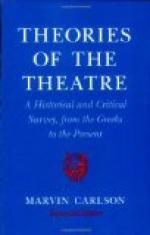A similar difference exists between the august Truth of tragedy and the less revelatory truthfulness of melodrama. To understand and to expound the laws of life is a loftier task than merely to avoid misrepresenting them. For this reason, though melodrama has always abounded, true tragedy has always been extremely rare. Nearly all the tragic plays in the history of the theatre have descended at certain moments into melodrama. Shakespeare’s final version of Hamlet stands nearly on the highest level; but here and there it still exhibits traces of that preexistent melodrama of the school of Thomas Kyd from which it was derived. Sophocles is truly tragic, because he affords a revelation of the absolute; but Euripides is for the most part melodramatic, because he contents himself with imagining and projecting the merely possible. In our own age, Ibsen is the only author who, consistently, from play to play, commands catastrophes which are not only plausible but unavoidable. It is not strange, however, that the entire history of the drama should disclose very few masters of the tragic; for to envisage the inevitable is to look within the very mind of God.
II. COMEDY AND FARCE
If we turn our attention to the merry-mooded drama, we shall discern a similar distinction between comedy and farce. A comedy is a humorous play in which the actors dominate the action; a farce is a humorous play in which the action dominates the actors. Pure comedy is the rarest of all types of drama; because characters strong enough to determine and control a humorous plot almost always insist on fighting out their struggle to a serious issue, and thereby lift the action above the comic level. On the other hand, unless the characters thus stiffen in their purposes, they usually allow the play to lapse to farce. Pure comedies, however, have now and then been fashioned, without admixture either of farce or of serious drama; and of these Le Misanthrope of Moliere may be taken as a standard example. The work of the same master also affords many examples of pure farce, which never rises into comedy,—for instance, Le Medecin Malgre Lui. Shakespeare nearly always associated the two types within the compass of a single humorous play, using comedy for his major plot and farce for his subsidiary incidents. Farce is decidedly the most irresponsible of all the types of drama. The plot exists for its own sake, and the dramatist need fulfil only two requirements in devising it:—first, he must be funny, and second, he must persuade his audience to accept his situations at least for the moment while they are being enacted. Beyond this latter requisite, he suffers no subservience to plausibility. Since he needs to be believed only for the moment, he is not obliged to limit himself to possibilities. But to compose a true comedy is a very serious task; for in comedy the action must be not only possible and plausible, but must be a necessary result of the nature of the characters. This is the reason why The School for Scandal is a greater accomplishment than The Rivals, though the latter play is fully as funny as the former. The one is comedy, and the other merely farce.




